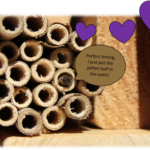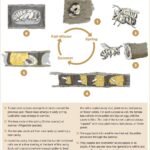I am a bit late on the topic of bees for fruit pollination, especially tree fruit, but I wonder how many readers use or maintain spring mason bees for pollination of tree fruits? If not for pollination, then perhaps just for fun? (Figure 1). If not, you might consider this for next season!
Those who rely on wild bees to pollinate their early-flowering fruit crops, already know that solitary bee species, including the mason bees, will readily search for and collect pollen during the cooler temperatures in early spring, so these bees can provide valuable pollination services when cooler temperatures render honey bees less active.
Mason bees are different from honey bees in several ways: they are solitary (one female lives alone and collects pollen for each of her offspring), they use hollow stems as their nesting sites, within each stem they build individual cells for each of their bee larvae using mud (thus the name mason bees), and they carry pollen on the bottom of their abdomens rather than on pockets on the hind legs – so cute! (See Figure 2 below for a diagram of the life cycle).
Although mason bees are capable of stinging, many refer to these bees as “stingless bees,” because they are docile and non-aggressive, which makes them a perfect project for kids who want to see bees in action, up close and personal!
I’ve been keeping mason bees in my backyard for the last 4 years – just for fun, and they have been wonderful to watch! Mason bee adults only live for about 1 month (May-June) before their life span is complete, but that’s plenty of time for them to contribute to pollination and for you to enjoy hosting them! All these bees need to be at home in your backyard or orchard are nesting sites (hollow stems), plenty of flowers (fruit blossoms, spring wildflowers, etc), access to mud, and if in the backyard, they will need a box or house where the stems are protected from rain and predators. Michigan State University has a great extension publication about Building and Managing Bee Hotels for Wild Bees. Take a look and consider hosting these bees in your backyard or orchard next year!
- Figure 1. A mason bee, peeking out from her stem nest in my backyard bee house. Photo: E. Y. Long
- Figure 2. Life cycle of tunnel-nesting bees. Diagram from Building and Managing Bee Hotels for Wild Bees, Michigan State University. Image credit: Sarah Scott, Michigan State University.

